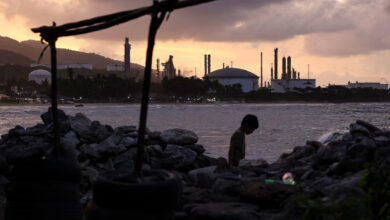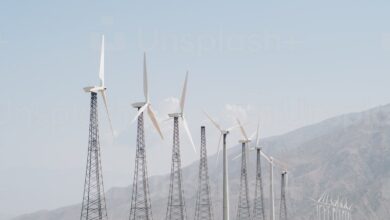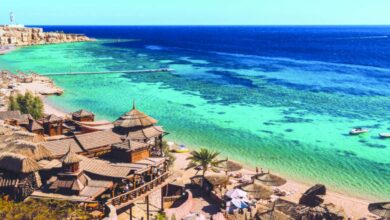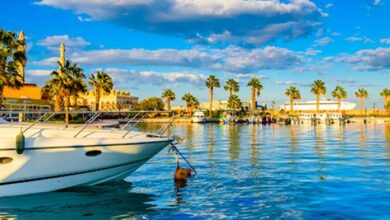Imagine a pool, with turquoise, crystalline water, that extends over an area of ten hectares and is situated in the middle of the desert.
This is not a mirage, but rather a project already underway near Sharm el-Sheikh, developed by Chilean company Crystal Lagoons Corps. What is going to be the world’s largest navigable lagoon will cover 12 hectares and will be located in an inhospitable desert area not far from Sharm el Sheikh’s bustling resorts.
Joaquin Konow, development manager for Crystal Lagoons Corps in Chile, reached by phone by Al-Masry Al-Youm, explains that the 12-hectare lagoon “only constitutes the first phase of our Sharm el-Sheikh project, which should hopefully be completed by the end of 2010. Then we will start the second phase, which involves the construction of ten additional lagoons encircling the first one, holding in total more than 100 hectares of clear water.”
At a cost of US$350,000 per hectare, the first lagoon to emerge in the desert will cost a total of US$4.2 million. These lagoons, designed to offer a beach-like environment and aquatic sports according to the company's brochure, are being financed by two Egyptian real estate companies, Golden Pyramids Plaza Co. (the firm behind City Stars Mall) and tourism development group Soma Bay from Hurghada.
“We were contacted by these Egyptian real estate companies,” explains Konow, adding that his company sells a franchise for each project that includes Crystal Lagoons’ patented technology to handle vast amounts of water and know-how for building and maintaining the lagoons.
“We are involved in every stage of the construction and maintenance of the lagoons, and provide assistance in architecture, conception, engineering work and on-site supervision,” Konow adds.
But their involvement does not stop there. “We also monitor 24/7 the water quality of all our lagoons all over the world from our headquarters in Chile through a telemetric system that receives information about the water quality from sensors integrated in each lagoon," he explains. "And we can adjust any slight deviation from our office.”
Asked about the lagoon's potential environmental impact on the local ecosystem, Konow points out that “our lagoons are a green technology, using only 2 percent of the energy a regular pool consumes, and 100 times less chemicals.” The lagoons, he adds, are ten times less water-intensive than a standard golf course.
“The Chilean government and UNESCO rewarded our technology with a Green Technology tag,” he stresses.
For the planned artificial oasis in Sharm el Sheikh, which will be replete with six five-stars hotels, wells have been constructed to extract brackish water from the water tables before recirculating it into the lagoons. Brackish water is a mix of seawater and fresh water that is, according to Konow, unfit for human consumption or agriculture.
Khaled Abu Zeid, senior water resources specialist at the Center for Environment and Development for the Arab Region and Europe (CEDARE), shows some concerns about the project, especially regarding the intensive extraction of brackish water.
“This water is a mix of salt water that seeped from the sea into the aquifers and rain water from flash floods that have reached underground," he says. "The salt water is heavier and lies at the bottom of the aquifer, while fresh rain water is on top.”
“My biggest concern is that, by doing excessive pumping to compensate for the evaporation of the future lagoons’ water, there will be an automatic increase of seepage from the sea water, which could reach the clear water underground," he adds.
Abu Zeid confirms that, in order to be suitable for human consumption, brackish water must be desalinated first. The only type vegetation that can benefit from brackish water is mangrove, he notes, which does not exist in the Sharm el-Sheikh area.
“It is very difficult to understand the risks such a project could pose to the ecosystem without conducting a proper impact assessment study first,” he says.
What he sees as a positive aspect, however, is that the lagoon will be situated in a remote area rather than on the seashore. “Indeed, many hotels in Sharm el-Sheikh build artificial beaches on rocky areas by filling them in with sand, which is devastating to corals and marine life," Abu Zeid says.
Crystal Lagoons Corps’ ambition in Egypt appears unlimited, with a dozen other lagoon projects throughout the country now being discussed. The company is also considering building lagoons in Cairo and Alexandria, but Konow wouldn’t disclose any details on these, arguing that “we are still in talks with local real estate companies and this information is under the seal of confidentiality for now.”




